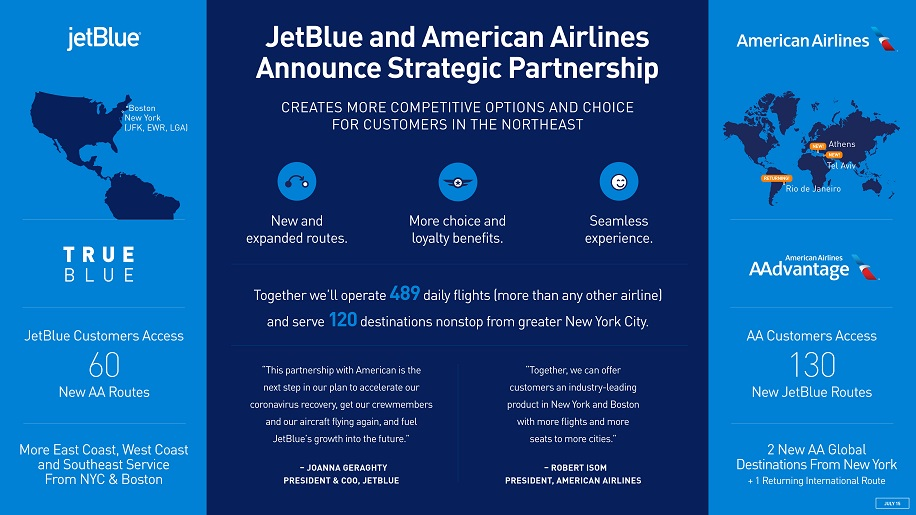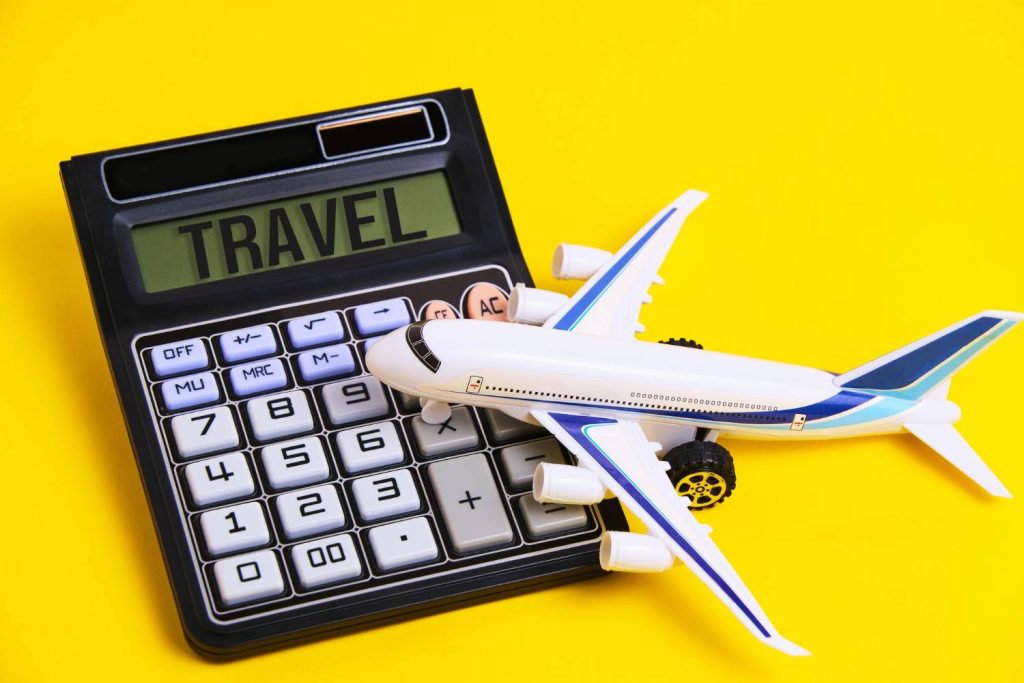JetBlue Airways is gearing up for a significant partnership announcement that could reshape its operations in the competitive airline industry. As the airline’s president hints at a potential collaboration with United Airlines, JetBlue aims to enhance its market position by leveraging a more extensive network that can benefit travelers. This strategic move aligns with JetBlue’s ongoing efforts to establish fruitful airline partnerships, particularly to boost customer engagement through its TrueBlue loyalty program. With larger competitors like Delta Air Lines and American Airlines recently making headlines, this partnership could prove vital in retaining and attracting frequent flyers. As such, JetBlue Airways news will undoubtedly capture the attention of industry watchers and travelers alike, marking an exciting development for the airline’s future.
In the coming weeks, JetBlue is set to unveil a crucial alliance with an established U.S. airline, potentially expanding its reach and customer offerings. This collaboration aims to enhance the airline’s operational capabilities and provide customers with a broader array of travel rewards within the TrueBlue loyalty program. Following the challenges faced with previous partnerships, including aborted mergers and antitrust issues, JetBlue’s new endeavor highlights its focus on competitiveness in the airline sector. As discussions with a major carrier unfold, travelers could soon benefit from more convenient travel options and the ability to earn points on new itineraries. With this new airline partnership, JetBlue aims to solidify its presence amidst larger rivals, ultimately enhancing the travel experience for its loyal customers.
JetBlue Partnership Announcement: What It Means for Travelers
JetBlue Airways is on the verge of announcing a significant partnership with another U.S. airline, potentially United Airlines, which could reshape travel options for many customers. This partnership focuses on expanding JetBlue’s market reach by tapping into a larger network, thereby allowing passengers to earn and redeem TrueBlue loyalty points on more routes. For frequent travelers, particularly those who often fly from the Northeast to areas not currently serviced by JetBlue, this collaboration could introduce new opportunities to accrue valuable rewards.
The implication of JetBlue’s partnership is profound, as it aims to enhance customer experiences and strengthen its competitive stance against major players like Delta Air Lines. With the promise of expanded routes and improved loyalty benefits through the TrueBlue loyalty program, travelers may find themselves enjoying more flexible travel options and the chance to earn points on destinations previously unavailable to them. This strategic move highlights JetBlue’s commitment to improving its offerings in a market dominated by larger airlines.
The Impact of JetBlue’s Airline Partnerships on Loyalty Programs
The expansion of JetBlue’s partnerships can significantly enhance the TrueBlue loyalty program, which already offers various perks for its members. By collaborating with a more extensive airline network, members will have greater access to earning points on flights that JetBlue does not directly operate. This will not only increase the program’s appeal but will also elevate customer satisfaction, as travelers seek opportunities to maximize benefits from their loyalty memberships.
Moreover, JetBlue’s strategy to forge partnerships aligns with industry trends where airline collaborations facilitate seamless travel for customers. Effective partnerships enable airlines to share resources and create robust loyalty programs that best serve their customers. As JetBlue looks to secure a partnership, it must ensure that the selected airline possesses a complementary network that enhances the TrueBlue program, making it more attractive for potential and existing members.
JetBlue’s Competitive Strategy in the Airline Industry
JetBlue’s current endeavor to secure a partnership stems from its need to bolster its competitive strategy in the airline industry, particularly against larger carriers like Delta and United Airlines. Recent challenges, such as blocked acquisitions and abandoned agreements due to antitrust concerns, have heightened the urgency for JetBlue to enhance its market position. A successful partnership could allow JetBlue to diversify its offerings and improve its service network, crucial for attracting and retaining loyal customers.
With the airline industry continually evolving, JetBlue is adopting a proactive approach by seeking alliances that fortify its market position. By expanding its service reach, JetBlue not only aims to compete more effectively but also enriches the travel experience for customers, allowing them access to a broader selection of destinations and the ability to earn TrueBlue points across a wider range of flights.
Analyzing the Importance of Network Size in Aviation Partnerships
In aviation, the size of an airline’s network is a critical factor in determining its competitiveness. For JetBlue, forging partnerships with airlines that have vast networks can lead to significant advantages, such as increased flight options for customers and enhanced loyalty rewards. JetBlue’s president has highlighted how important it is; for example, customers flying to less popular destinations should have the chance to earn TrueBlue points even when traveling outside JetBlue’s own routes.
Industry experts note that the airline with the more extensive network often holds a competitive edge in attracting business travelers and vacationers alike. As JetBlue pursues a partnership, it understands that aligning with an airline that boasts a substantial network will not only provide immediate benefits to its customers but will also bolster its brand reputation and market presence in a challenging industry landscape.
JetBlue’s Recent Challenges and Commitment to Partnerships
Recently, JetBlue has faced a series of challenges in its pursuit of strategic partnerships, exemplified by the failure of its attempted acquisition of Spirit Airlines and a partnership with American Airlines that ended in 2023 due to legal complications. These setbacks have intensified JetBlue’s determination to explore new partner opportunities, underscoring the importance of collaboration in a rapidly changing market where scale and network access are paramount.
Despite these setbacks, JetBlue remains committed to finding partners that can enhance its offerings and provide greater benefits to its TrueBlue loyalty program. As it continues to explore potential alliances, the airline has the opportunity to learn from previous experiences and build a partnership strategy that aligns more closely with shareholder expectations while delivering value to customers.
Future Prospects for JetBlue Following Partnership Announcements
Looking towards the future, the announcement of a partnership could reshape JetBlue’s trajectory in the competitive airline landscape. Depending on the chosen partner, this collaboration may facilitate significant changes in how JetBlue customers book flights and earn rewards. Analysts remain cautiously optimistic, as the partnership could introduce new routes and increases frequency on existing ones, benefiting travelers eager for better connectivity.
Additionally, a successfully executed partnership could lead to enhanced marketing opportunities and customer engagement strategies, allowing JetBlue to leverage the strengths of its partner airline to attract new customers and retain existing ones. As travel demand continues to recover, JetBlue’s ability to adapt through partnerships will be critical for its future growth and sustainability in the airline industry.
JetBlue and United Airlines: A Potential Match
The speculation around JetBlue forming a partnership with United Airlines has generated considerable interest within the industry. United’s extensive network would complement JetBlue’s operations, providing more choices for travelers and a broader footprint in various markets. For JetBlue, this partnership is an enticing opportunity to strengthen its position against larger competitors while offering its customers vastly improved travel options.
Should discussions with United Airlines come to fruition, it’s anticipated that customers could benefit from seamless integration of flight schedules, coordinated loyalty programs, and the ability to earn TrueBlue points for travel across a wider expanse of routes. This could significantly enhance JetBlue’s service proposition, especially for loyal customers who frequently travel beyond JetBlue’s direct service areas.
The Role of Antitrust Regulations in Airline Partnerships
The landscape of airline partnerships is heavily influenced by antitrust regulations, which have posed challenges for JetBlue in establishing successful collaborations. The Justice Department’s interference in the proposed acquisition of Spirit Airlines exemplifies the scrutiny that airlines face when attempting to consolidate their networks. This regulatory environment underscores the complexity of forming partnerships that comply with legal standards while still achieving the desired expansion.
JetBlue’s current discussions for partnerships must navigate the fine line between enhancing service offerings and adhering to antitrust laws. As they explore new alliances, the need for strategic planning that anticipates regulatory hurdles will be more important than ever. Engaging in open dialogue with regulatory bodies can aid JetBlue in creating a sustainable partnership model that not only satisfies legal requirements but also enriches the travel experience for its customers.
JetBlue’s Strategy to Build Brand Loyalty through Partnerships
JetBlue has long been a proponent of building customer loyalty, and partnerships are a strategic avenue to reinforce this brand attribute. Through a thoughtful collaboration with another airline, JetBlue can enhance the TrueBlue loyalty program, offering members new and more exciting ways to earn and redeem points. This comes at a time when customers are increasingly looking for airlines that provide not just transportation, but loyalty rewards that add tangible value to their travel experiences.
Strategically aligning itself with a larger airline could bring JetBlue’s commitment to customer service and satisfaction to the next level. By leveraging combined strengths, JetBlue can create more compelling packages and offers that resonate with today’s savvy travelers. Ensuring their loyalty program remains attractive and relevant will be key in maintaining JetBlue’s competitive edge in an industry where customer loyalty is essential for sustained success.
Frequently Asked Questions
What can we expect from the upcoming JetBlue partnership announcement?
The JetBlue partnership announcement is expected to detail a collaboration with another U.S. airline, potentially United Airlines, aimed at enhancing JetBlue’s market position and expanding its network. This partnership could allow JetBlue customers to earn and redeem TrueBlue loyalty points over a wider range of destinations.
How will the JetBlue partnership impact the TrueBlue loyalty program?
The JetBlue partnership is likely to improve the TrueBlue loyalty program by increasing the destinations where members can earn and redeem points. This move is critical for customers traveling to areas not currently serviced by JetBlue, thus enhancing overall loyalty benefits.
What challenges have JetBlue faced regarding airline partnerships in the past?
JetBlue has encountered several challenges with airline partnerships, including a blocked acquisition of Spirit Airlines by the Justice Department and a failed partnership with American Airlines due to an antitrust lawsuit in 2023. These setbacks have emphasized the need for strategic partnerships to compete effectively.
Why is JetBlue looking to partner with a larger airline?
JetBlue is pursuing partnerships with larger airlines to bolster its competitiveness against major players like Delta Air Lines and United Airlines. A partnership would expand JetBlue’s network and improve offerings for customers, particularly in regions where JetBlue currently lacks service.
What specific benefits can customers expect from the JetBlue and United Airlines partnership?
Customers can expect enhanced travel options and greater flexibility from the potential JetBlue and United Airlines partnership, including expanded earning opportunities for TrueBlue loyalty points across a broader range of destinations and improved connectivity.
How will the new partnership affect JetBlue’s market position?
The new partnership is expected to strengthen JetBlue’s market position by allowing it to leverage the larger airline’s network, ultimately making JetBlue a more competitive player in the airline industry and providing customers more benefits when traveling.
Are there any recent developments regarding JetBlue’s partnership efforts?
Yes, during a recent earnings call, JetBlue’s president indicated that the airline is actively discussing potential partnerships with several carriers. This step marks a proactive approach to enhance JetBlue’s service offerings amid competitive pressures.
| Key Point | Details |
|---|---|
| Partnership Announcement | JetBlue Airways is preparing to announce a partnership with another U.S. airline. |
| Potential Partner | The potential partner may be United Airlines. |
| Reason for Partnership | JetBlue is looking for partnerships to compete with larger airlines like Delta and United. |
| Past Attempts | Previous attempts were blocked, including the acquisition of Spirit Airlines and a partnership with American Airlines. |
| Loyalty Program Expansion | The partnership aims to expand JetBlue’s TrueBlue loyalty program, allowing customers to earn points for destinations not currently served. |
| Current Market Situation | Delta has no pending partnerships; Alaska Airlines is focused on a merger; American Airlines has ended discussions with JetBlue. |
| CEO’s Statement | Marty St. George highlighted that a larger network is crucial for customer loyalty and flexibility. |
| Future Outlook | The success of the partnership discussions will depend on demonstrating value to shareholders. |
Summary
The JetBlue partnership announcement is a significant move towards enhancing the airline’s competitive edge. By seeking to establish a partnership with another U.S. airline, particularly potentially with United Airlines, JetBlue aims to effectively broaden its network and provide greater benefits for its TrueBlue loyalty program. This initiative follows a series of unsuccessful attempts to expand through acquisition and other partnerships, and it reflects JetBlue’s response to the competitive pressure from larger airlines like Delta and United. As the airline industry continues to evolve, this potential partnership could play a crucial role in securing JetBlue’s market position and expanding its service offerings to customers.



